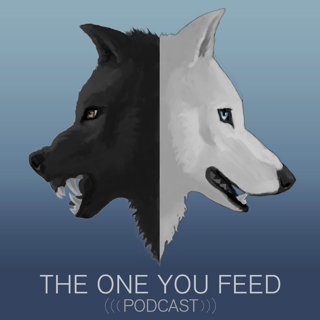
John Prendergast
This week we talk to John Prendergast about tuning into our body John J. Prendergast, PhD, is a psychotherapist, retired professor of psychology, spiritual teacher, and founder and editor-in-chief of Undivided: The Online Journal of Nonduality and Psychology. He received my undergraduate degree from UC Santa Cruz and my M.A. and Ph.D. from the California Institute of Integral Studies. He is licensed as a Marriage and Family Therapist. His latest book is called In Touch: How to Tune into the Inner Guidance of Your Body and Trust Yourself In This Interview, John Prendergast and I Discuss: The One You Feed parable How important our body is What "knowing" is Learning to trust our deeper knowledge The difference between inner knowing and hunches based on fear Finding true knowing from ego desires The static in our system Observing thoughts as just thoughts For more show notes visit our websiteSee omnystudio.com/listener for privacy information.See Privacy Policy at https://art19.com/privacy and California Privacy Notice at https://art19.com/privacy#do-not-sell-my-info.
8 Kesä 201649min

Russell Simmons
This week we talk to Russell Simmons about being a giver Russell Simmons is an American entrepreneur and author. He began his entrepreneurial career in his youth, but on the wrong side of the law, selling marijuana to make money while an active member of a local gang. He then partnered with Rick Rubin to create Def Jam Records, and signed artists like the Beastie Boys, LL Cool J, Public Enemy and Run-D.M.C. He is also The Chairman and CEO of Rush Communications, he cofounded the hip-hop music label Def Jam Recordings and created the clothing fashion lines Phat Farm, Argyleculture, and Tantris. He is also a vocal proponent of meditation and veganism. His latest book is called The Happy Vegan: A Guide to Living a Long, Healthy, and Successful Life In This Interview, Russell Simmons and I Discuss: The One You Feed parable How good givers are great getters Giving before you get Dissociating ourselves from the results of our labors How success and fame don't necessarily make us happy Improving our health through veganism Improving the health of the planet through veganism Corporate greed The horrors of factory farming His experience with Occupy Wall Street The corruption in politics His daily yoga practice Combining yoga, meditation, and veganism Remaining useful and active as we age For more show notes visit our websiteSee omnystudio.com/listener for privacy information.See Privacy Policy at https://art19.com/privacy and California Privacy Notice at https://art19.com/privacy#do-not-sell-my-info.
1 Kesä 201627min

Benjamin Shalva
This week we talk to Benjamin Shalva about spiritual cross training Benjamin Shalva is a rabbi, writer, and yoga instructor, he leads spiritual cross-training seminars and workshops around the world. He received his rabbinical ordination from the Jewish Theological Seminary in New York City and his yoga teacher certification from the Yogic Physical Culture Academy in Los Cabos, Mexico. Shalva serves on the faculty of the Jewish Mindfulness Center of Washington and the 6th & I Historic Synagogue in Washington, DC, leads musical prayer services for Bet Mishpachah in Washington, DC, and spends his summers as the camp rabbi of Tamarack Camps in Michigan. His writings have been published in the Washington Post, Elephant Journal, and Spirituality & Health magazine. Born in Milwaukee, Wisconsin, he lives in Reston, Virginia, with his wife and their children. His new book is: Spiritual Cross-Training: Searching Through Silence, Stretch, and Song In This Interview, Benjamin Shalva and I Discuss: The One You Feed parable His book, Spiritual Cross-Training: Searching through Silence, Stretch & Song How he has been searching all of his life That spiritual work produces nothing tangible That spiritual growth is slow yet real & discernable in our lives Spiritual connection & growth, like friendship, is built through time, energy & attention What "spiritual cross-training" is His spiritual experience with the 3 modalities of silence, stretch & song How sticking to just one spiritual practice, over time becomes hobby The importance of "diving deep" into your chosen 2-3 spiritual practices How to deal with ego & ambition when it shows up in your spiritual practice How inviting the ego voice in his head to join him in his spiritual practice has been a useful tool in his life How what you resist, persists That, in the spiritual journey "...when we've exhausted all other options, we always have one weapon left in our arsenal....laughter"See omnystudio.com/listener for privacy information.See Privacy Policy at https://art19.com/privacy and California Privacy Notice at https://art19.com/privacy#do-not-sell-my-info.
24 Touko 201634min

Behavior Change Mistake #2
Get more information on The One You Feed Coaching Program. Enrollment open until May 25th The #2 Mistake Most People Make When Trying to Change Behavior: Dropping Old Behaviors Without Putting Something In Their Place Nature abhors a vacuum. Behaviors that have been done frequently enough that they have become habits are things that are now done mindlessly or effortlessly during our day. If at a certain time of day you do something and then all of the sudden you stop doing that thing, you are now left with a slice of time that was filled and is now empty. When faced with that empty space of time, it’s going to be really hard to resist doing the thing you’ve become habituated to do. So, put some other behavior in it’s place. In addition, a lot of our “negative” behavior patterns happen for a reason. There is something that they are doing for us (or did at one time). Removing them without some sort of substitute leaves a need unmet. For example, let’s say that everyday when you get home from work you have a snack. You’d like to stop having that snack because it’s close to dinner time and you don’t want the extra calories. Instead of coming home from work, sitting on the couch and doing nothing, resisting the urge to have something to eat, maybe you go for a 15 minute walk around your neighborhood instead. Get more information on The One You Feed Coaching Program. Enrollment open until May 25th The Tale of Two Wolves A grandfather is talking with his grandson and he says there are two wolves inside of us which are always at war with each other. One of them is a good wolf which represents things like kindness, bravery and love. The other is a bad wolf, which represents things like greed, hatred and fear. The grandson stops and thinks about it for a second then he looks up at his grandfather and says, “Grandfather, which one wins?” The grandfather quietly replies, the one you feed The Tale of Two Wolves is often attributed to the Cherokee indians but there seems to be no real proof of this. It has also been attributed to evangelical preacher Billy Graham and Irish Playwright George Bernard Shaw. It appears no one knows for sure but this does not diminish the power of the parable.See omnystudio.com/listener for privacy information.See Privacy Policy at https://art19.com/privacy and California Privacy Notice at https://art19.com/privacy#do-not-sell-my-info.
21 Touko 20165min

Robbie Vorhaus
This week we talk to Robbie Vorhaus about following your heart Robbie Vorhaus is widely recognized as one of the top three reputation and crisis experts and advisors in the world. Robbie’s path is fascinating: On the outside, renowned crisis expert and communications strategist, Robbie Vorhaus’ life appeared ideal: a New York City Park Avenue apartment, a home in the Hamptons, two adoring children in world-class private schools, and a thriving PR agency representing world leaders, celebrities, sports stars, entrepreneurs and Fortune 500 companies. Privately, though, his life was falling apart. A marriage in trouble, jeopardized health, and financial pressures culminated on vacation when his family asked: “Dad, are you really happy?” Realizing he was in peril of losing everything he held dear, Robbie courageously followed the advice he had given clients for decades: Follow your heart. Choose to be happy. And consciously make everything better than you found it. The result: Vorhaus closed his agency, moved his family to their small Sag Harbor home, started a leadership and crisis consultancy, and began anew. Now transformed, healthy, happy, and celebrating a marriage of more than 25 years, Robbie drew on his life’s work and experience to write a column for his local newspaper, The Sag Harbor Express, outlining a step-by-step plan for following your heart and being happy, which, after going viral, became the basis for his next seven years writing. His book is called One Less. One More. – Follow Your Heart. Be Happy. Change Slowly. In This Interview, Robbie Vorhaus and I Discuss: The One You Feed parable The choice we face in every moment How if we feed our ego we are always alone, if we feed our heart we are always connected How you have to start now The math of One Less, One More Add one more good thing to your life each day and do one less thing negative thing Why we fail at major life transformation when we try to do too much at once The uniqueness of every human Doing less of what is no longer working for you Facing the fork in the road How there will always be resistance to our dreams. Committing to being our own person Following our heart The process of becoming How much choice do we have in our mood? The power of curiosity The power of small changes The crying Zen Monk If you think you are enlightened spend a weekend with your family Dealing with the perception of others How we tend to judge people by their worst moments Not allowing others to define us Do we want to be dust or ash? How wealth and fame do not necessarily bring happiness Committing to being our own person and being authentic For more notes visit our show page Learn more about the new coaching program. The window is open until 11:59 May 25th to sign upSee omnystudio.com/listener for privacy information.See Privacy Policy at https://art19.com/privacy and California Privacy Notice at https://art19.com/privacy#do-not-sell-my-info.
17 Touko 201643min

The #1 Mistake People Make When Trying to Change Behavior
The #1 Mistake Most People Make When Trying to Change Behavior Starting Too Big The key to making lasting change is to break things down into really small steps. Most people want to start at point A and jump to Point Z but you don’t get there overnight. Break the new habit down into the smallest possible increments and be specific when planning each step along the way. In the beginning the most important part of behavior change is to be successful. This increases your motivation and makes you want to do more. If you start small it is much easier to “succeed” and build from there. For example, let’s say you want to take up a meditation practice. Instead of trying to meditate for 30 minutes a day, start with 3 minutes. Then once that becomes a daily habit increase it to 5 minutes, etc. As Leo Babuta of Zen Habits says “Make it so easy you can’t say no.” On one of our earlier episodes Dan Millman discussed the importance of “starting small and connecting the dots”. You will be amazed at what a series of small steps done consistently over a period of time will accomplish. The Tale of Two Wolves A grandfather is talking with his grandson and he says there are two wolves inside of us which are always at war with each other. One of them is a good wolf which represents things like kindness, bravery and love. The other is a bad wolf, which represents things like greed, hatred and fear. The grandson stops and thinks about it for a second then he looks up at his grandfather and says, “Grandfather, which one wins?” The grandfather quietly replies, the one you feed The Tale of Two Wolves is often attributed to the Cherokee indians but there seems to be no real proof of this. It has also been attributed to evangelical preacher Billy Graham and Irish Playwright George Bernard Shaw. It appears no one knows for sure but this does not diminish the power of the parable.See omnystudio.com/listener for privacy information.See Privacy Policy at https://art19.com/privacy and California Privacy Notice at https://art19.com/privacy#do-not-sell-my-info.
14 Touko 20166min

Mary O"Malley
This week we talk to Mary O'Malley about awakening to the world around us Mary O’Malley is an author, teacher, and counselor whose work awakens others to the joy of being fully alive. Her inspired and transformative approach to compulsions offers a way to replace fear, hopelessness and struggle with ease, well-being and joy. Through her individual counseling and coaching, books, classes, retreats and ongoing groups, Mary invites people to experience the miracle of awakening. Acknowledged as a leader in the field of Awakening by many Mary clearly sees both the big picture and the details of human patterns and conditioning. She possesses an extraordinary ability to understand and connect with people. And she is skilled in empowering people to work with difficult mind states resulting in greater inner awareness and presence and a greater capacity for joy. Eckhart Tolle says, “Thank you, Mary, for your contribution to the evolution of human consciousness.” Her latest book is called What’s In the Way, Is the Way: A Practical Guide to Awakening. In This Interview, Mary O'Malley and I Discuss: The One You Feed parable The intertwining of good and bad, the yin and yang Dealing with eating problems How what we fight, we empower Creating a relationship with the dark side The impact of the early years of our lives The conditioned self How we are addicted to struggle Being present to life instead of thinking our way through life The "low-grade suffering" that permeates our lives The storyteller in our minds The Four Let's- Let Life, Let it Be, Let it Go, Learning to not listen so closely to the storyteller in our mind The difference between being here for life and being in a conversation about life For more show notes visit our websiteSee omnystudio.com/listener for privacy information.See Privacy Policy at https://art19.com/privacy and California Privacy Notice at https://art19.com/privacy#do-not-sell-my-info.
11 Touko 201653min

Dan Harris and Oren Sofer
This week we talk to Dan Harris and Oren Sofer aboutmindful communicationOur guests this week are Dan Harris and Oren Sofer. Dan was a previous guest and we discussed his great book, 10%Happier. In addition, Dan is the current anchor on the weekendedition of Good Morning America as well as Nightline. He has begun creating a series of courses based around 10%Happier. One of those courses features Oren Sofer. Oren is a teacher and practitioner of Buddhist meditation,Nonviolent Communication (NVC), and Somatics. Oren is a specialistin the role of mindfulness in creating better conversation. This conversation was recorded in Dan's office in the ABCStudios in New York. Our Sponsor this Week isCasper MattressVisit casper.com/feed and use the promo code“feed” to get $50 off!! In This Interview, Oren Dan and I Discuss:The One You Feed parableWhy mindfulness is useful in communicationThe10% Happier appLearning to see confrontation as an opportunity to improve therelationshipHow our cultural conditioning teaches us the Win/LoseparadigmHow we have a strong negative conditioning againstconfrontation that becomes hard-wiredHow mindfulness allows us to slow down and monitor ouremotional reactions in conversationThe role of curiosity in communicationHow to become more curiousLearning to ask "What matters here" when listening toothersLearning to say that we don't feel like talking instead of justpretendingThe minor discomfort of being realHow to say things in a way that the other person can hear andunderstandLearning to hold our tongue in certain situationsHow being silent can lead to its own challengesThe importance of timing in choosing when to addressissuesContext sensitive communicationThe two criteria of good communication: does the other personunderstand and does it lead to connectionDan Harris Links10% Happier HomepageTwitterFacebookOren Sofer LinksHomepageSee omnystudio.com/listener for privacy information.See Privacy Policy at https://art19.com/privacy and California Privacy Notice at https://art19.com/privacy#do-not-sell-my-info.
4 Touko 201649min





















